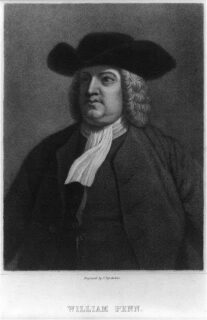
William Penn's Idea of Liberty of Conscience
William Penn, while acceding to Pennsylvania colonists’ demand for power over changes to their governing charter, insisted that allowances for liberty of conscience never be removed from the Pennsylvania charter. Penn’s commitment to religious toleration was central to his vision for the colony he founded, as can already be seen in an “Act for Freedom of Conscience” passed by the first Pennsylvania Assembly, shortly after the colony’s founding. This act stipulated that all monotheists would be allowed to worship in their own ways. It did not provide for full religious liberty, since it stipulated that office holders be Christian and limited the franchise to Christians. It also specified fines for profanity and other speech offensive to Christians, “to the end that looseness, irreligion, and atheism may not creep in under pretense of conscience in this province.”
That Penn saw religious toleration as a means of reinforcing theistic belief, rather than diluting it, can be seen in the opening of the act, which states his own intent in designing Pennsylvania’s government as to “make and establish such laws as shall best preserve true christian and civil liberty in opposition to all unchristian, licentious, and unjust practices, whereby God may have his due, Caesar his due, and the people their due, from tyranny and oppression on the one side and insolence and licentiousness on the other.”
In the revised design of government, the 1701 “Charter of Liberties,” the very first article reiterates the philosophical basis for religious toleration:
. . . No people can be truly happy, though under the greatest enjoyment of civil liberties, if abridged of the freedom of their consciences as to their religious profession and worship. And Almighty God being the only lord of conscience, father of light and spirits, and the author as well as object of all divine knowledge, faith, and worship, who only does enlighten the minds and persuade and convince the understandings of people, I do hereby grant and declare that no person or persons inhabiting in this province or territories, who shall confess and acknowledge one almighty God, the creator, upholder and ruler of the world; and profess him or themselves obliged to live quietly under the civil government, shall be in any case molested or prejudiced in his or their person or estate because of his or their conscientious persuasion or practice, nor be compelled to frequent or maintain any religious worship, place, or ministry contrary to his or their mind, or to do or suffer any other act or thing contrary to their religious persuasion.


